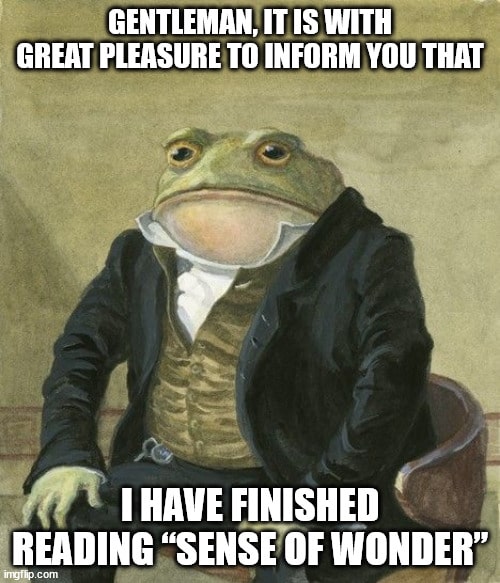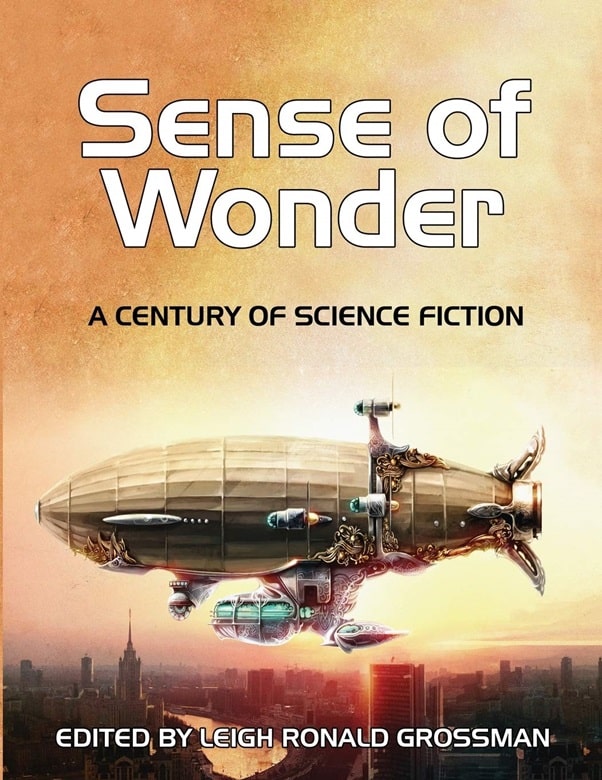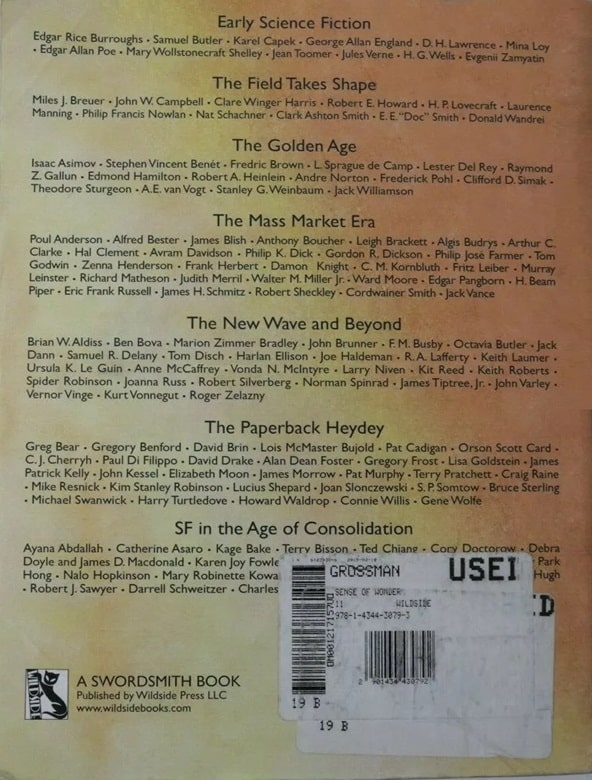Reading Leigh Grossman’s Sense of Wonder, the Longest Science Fiction Anthology Ever

Having just finished reading arguably the longest anthology of science fiction, I’ve written down some notes and thoughts.
TL;DR It’s an insanely long book, worth buying but not necessarily reading cover-to-cover.
About the Book
Sense of Wonder: A Century of Science Fiction, edited by Leigh Grossman, is a massive single-volume anthology of science-fiction. Don’t be fooled by the 992 print pages because that is with a tiny font. I read the Kindle version for which Amazon gives an average reading time of 140 hours. That is about 5 times as long as Cryptonomicon by Neal Stephenson (itself a 1,200 page door-stopper). All in all, a huge dose of SF.
The book is classified and marketed as a textbook for teaching SF courses and rightly so. Besides over 150 stories (from short stories to novellas), it contains biographical entries about each author and additional essays about related topics. The appendices give advice to aspiring authors on writing and submitting SF stories.
 |
 |
Sense of Wonder: A Century of Science Fiction (Wildside Press, June 1, 2011). Cover art uncredited
In terms of content, Sense of Wonder includes whole “books” like A Princess of Mars by Edgar Rice Burroughs and The Time Machine by H.G. Wells, both from The Classics of Science Fiction – Novels v5 list. It also has at least 34 entries from The Classics of Science Fiction – Short Stories v2 list. Apart from poems, each author appears with only one entry (story).
My Opinion
This book is a bargain! I bought it for $30 and definitely got my money’s worth in terms of content.
I wish it were more of a “best of” anthology. It comes close to that (as evidenced by the number of entries from the Classics list), but in some cases stories were unavailable or the authors had other suggestions. Here’s an example from the editor’s text:
Although he’s best known for his alternate history, when I contacted him about a contribution for this book, Turtledove correctly pointed out that I already had plenty of alternate history in the book, but sorely needed a baseball story.
The essays, each by a different contributor, were generally good, often discussing themes appearing in preceding stories. Some were quite academic (those went over my head) and one was so badly written I’m surprised it got included.
I also wish that the book was less American-centered. Not only in the way information is presented, but also in the selections. There are some by British, Canadian and Australian authors, but other than that only two stories are translated from foreign languages.
Notes
I started reading this book in 2001, but at first, I jumped from story to story as I was finishing reading the Classics of Science Fiction – Short Stories v2 list.
Then, halfway through 2024, in an ongoing effort to clean out unread books on my Kindle, I started going through it from the start. I omitted what I had already read, so that helped. To further improve my progress I looked for audio versions of the stories (with a success rate of about 20%).
This lead me to some great finds, such as the production of Terry Bisson’s “They’re Made Out of Meat” by the This American Life podcast. I made a spreadsheet for each story (whether I’d read it before and whether it’s available in audio anywhere) and included a brief review. Filling out the spreadsheets was part of the appeal of this reading challenge.
Favorite Stories
Apart from those that appear on the Classics list (and which we know to be good), I gave 5 stars to these stories.
- “Dogwalker” by Orson Scott Card — Great theme (cyberpunk, cracking passwords), fun style, and great audio narration all made this story kick!
- “Soldier, Ask Not” by Gordon R. Dickson — Awesome story of military conflict, loss and revenge. Noticeably well written!
- “Rat Race” by Frank Herbert — Great, like a precursor to X Files.
- “Good with Rice” by John Brunner — Wonderfully written story about modified food set in China.
- “For I Have Touched the Sky” by Mike Resnick — Great Kiringaya story about freedom and choosing the lesser evil.
Of course, there were also stories which I didn’t enjoy, but that’s inevitable with such a large collection.
If you’re interested in short form SF, I would recommend buying Sense of Wonder and starting out by reading the 34 stories already identified as among the best in the field.
Thanks for this article, Szymon. I have not read “Sense of Wonder” but I have read all the Science Fiction Hall of Fame volumes and I just picked up “The Big Book of Science Fiction”. I love a good list and working to cross off items completed – so a special thanks for the link to the Classics list. I will soon download it and start working away. More than a decade ago, I had come across a list of “100 Science Fiction Stories” and that has kept me looking for copies of old anthologies and of author’s “Best of” books. The Classics list is especially welcome because it doesn’t seem to be weighted so heavily toward newer stories (as lists like NPR’s Top 100 sci fi and fantasy books tend to be). Thanks again.